The 31 Most Famous Paintings – Must-Know Artworks
Art is constantly around us, yet not all of them become famous artworks. But what sets famous art paintings apart from the rest? The most famous paintings in the world are all recognized for some special quality that words cannot fully express – these old famous paintings have to be seen to be appreciated. Today we will discover the most popular paintings in the history of art.
Table of Contents
- 1 The Most Famous Paintings in the World
- 1.1 Primavera (1482) by Sandro Botticelli
- 1.2 Mona Lisa (c. 1503) by Leonardo da Vinci
- 1.3 The Ambassadors (1533) by Hans Holbein the Younger
- 1.4 Judith Slaying Holofernes (1610) by Artemisia Gentileschi
- 1.5 Christ in the Storm on the Sea of Galilee (1633) by Rembrandt van Rijn
- 1.6 The Night Watch (1642) by Rembrandt van Rijn
- 1.7 Girl with a Pearl Earring (c. 1665) by Johannes Vermeer
- 1.8 Death of Marat (1793) by Jacques-Louis David
- 1.9 Ophelia (1852) by Sir John Everett Millais
- 1.10 Whistler’s Mother (1871) by James McNeill Whistler
- 1.11 The Gross Clinic (1875) by Thomas Eakins
- 1.12 Bal du moulin de la Galette (1876) by Pierre-Auguste Renoir
- 1.13 Portrait of Madame X (1884) by John Singer Sargent
- 1.14 A Sunday Afternoon on the Island of La Grande Jatte (1884-1886) by Georges Seurat
- 1.15 Cafe Terrace at Night (1888) by Vincent van Gogh
- 1.16 The Starry Night (1889) by Vincent van Gogh
- 1.17 Self-Portrait Without a Beard (1889) by Vincent van Gogh
- 1.18 The Scream (1893) by Edvard Munch
- 1.19 At the Moulin Rouge (c. 1895) by Henri de Toulouse-Lautrec
- 1.20 Flaming June (c. 1895) by Sir Frederic Leighton
- 1.21 Two Tahitian Women (1899) by Paul Gauguin
- 1.22 The Kiss (1908) by Gustav Klimt
- 1.23 The Cyclops (c. 1914) by Odilon Redon
- 1.24 Three Musicians (1921) by Pablo Picasso
- 1.25 American Gothic (1930) by Grant Wood
- 1.26 The Persistence of Memory (1931) by Salvador Dalí
- 1.27 The Flower Carrier (1935) by Diego Rivera
- 1.28 Guernica (1937) by Pablo Picasso
- 1.29 The Two Fridas (1939) by Frida Kahlo
- 1.30 No. 5, 1948 (1948) by Jackson Pollock
- 1.31 The Son of Man (1964) by René Magritte
- 2 Frequently Asked Questions
The Most Famous Paintings in the World
Which are your favorite famous art paintings? Are they on our list of the world’s most famous paintings? Perhaps you will discover a few famous artworks you have not heard of before. Let’s dive into our list of the world’s most popular paintings in a quick overview.
| Rank | Painting Title | Artist | Year | Medium |
|---|---|---|---|---|
| 1 | Primavera | Sandro Botticelli | 1482 | Tempera on Panel |
| 2 | Mona Lisa | Leonardo da Vinci | c. 1503 | Oil on Panel |
| 3 | The Ambassadors | Hans Holbein the Younger | 1533 | Oil Paint |
| 4 | Judith Slaying Holofernes | Artemisia Gentileschi | 1610 | Oil on Canvas |
| 5 | Christ in the Storm on the Sea of Galilee | Rembrandt van Rijn | 1633 | Oil on Canvas |
| 6 | The Night Watch | Rembrandt van Rijn | 1642 | Oil on Canvas |
| 7 | Girl with a Pearl Earring | Johannes Vermeer | c. 1665 | Oil on Canvas |
| 8 | Death of Marat | Jacques-Louis David | 1793 | Oil on Canvas |
| 9 | Ophelia | Sir John Everett Millais | 1852 | Oil on Canvas |
| 10 | Whistler’s Mother | James McNeill Whistler | 1871 | Oil on Canvas |
| 11 | The Gross Clinic | Thomas Eakins | 1875 | Oil on Canvas |
| 12 | Bal du moulin de la Galette | Pierre-Auguste Renoir | 1876 | Oil on Canvas |
| 13 | Portrait of Madame X | John Singer Sargent | 1884 | Oil on Canvas |
| 14 | A Sunday Afternoon on the Island of La Grande Jatte | Georges Seurat | 1884-1886 | Oil on Canvas |
| 15 | Cafe Terrace at Night | Vincent van Gogh | 1888 | Oil on Canvas |
| 16 | The Starry Night | Vincent van Gogh | 1889 | Oil on Canvas |
| 17 | Self-Portrait Without a Beard | Vincent van Gogh | 1889 | Oil on Canvas |
| 18 | The Scream | Edvard Munch | 1893 | Oil, Tempera, Pastel, and Crayon on Cardboard |
| 19 | At the Moulin Rouge | Henri de Toulouse-Lautrec | c. 1895 | Oil on Canvas |
| 20 | Flaming June | Sir Frederic Leighton | c. 1895 | Oil on Canvas |
| 21 | Two Tahitian Women | Paul Gauguin | 1899 | Oil on Canvas |
| 22 | The Kiss | Gustav Klimt | 1908 | Oil and Gold Leaf |
| 23 | The Cyclops | Odilon Redon | c. 1914 | Oil on Canvas |
| 24 | Three Musicians | Pablo Picasso | 1921 | Oil on Canvas |
| 25 | American Gothic | Grant Wood | 1930 | Oil on Beaverboard |
| 26 | The Persistence of Memory | Salvador Dalí | 1931 | Oil on Canvas |
| 27 | The Flower Carrier | Diego Rivera | 1935 | Oil and Tempera on Masonite |
| 28 | Guernica | Pablo Picasso | 1937 | Oil on Canvas |
| 29 | The Two Fridas | Frida Kahlo | 1939 | Oil on Canvas |
| 30 | No. 5, 1948 | Jackson Pollock | 1948 | Oil on Fiberboard |
| 31 | The Son of Man | René Magritte | 1964 | Oil on Canvas |
Primavera (1482) by Sandro Botticelli
| Artist | Sandro Botticelli |
| Date Created | 1482 |
| Medium | Tempera on Panel |
| Current Location | Uffizi Gallery |
The image displays a crowd gathered in an orange grove. One of the first things to note is how little viewpoint is being used; whereas the bushes to the left and right provide some environmental perspective, we really do not see the one-point linear point of view that certain early Renaissance artists used so successfully in the 15th century.
Also, notice how the extremities of the majority of the figures are long and thin, giving them an exquisite appearance.
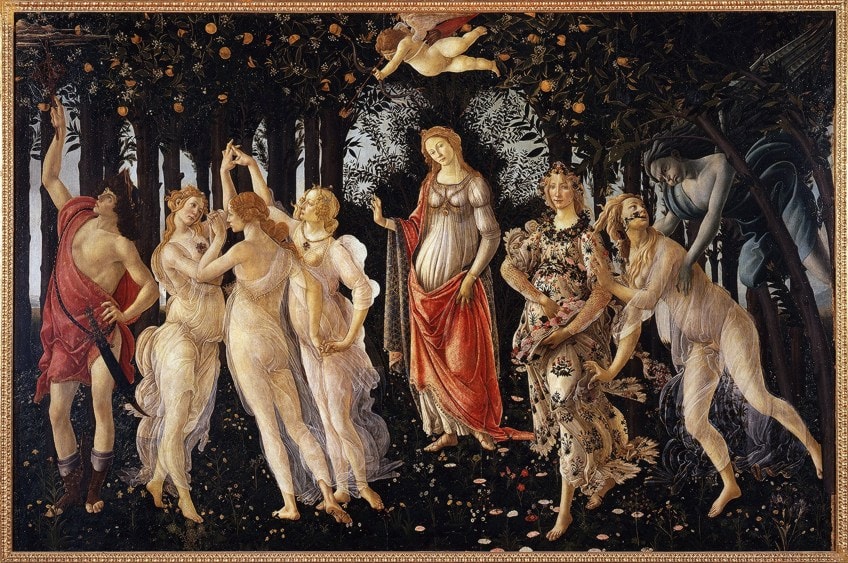
Mona Lisa (c. 1503) by Leonardo da Vinci
| Artist | Leonardo da Vinci |
| Date Created | 1503 |
| Medium | Oil on Panel |
| Current Location | Louvre, Paris |
This portrait of a female, clothed in the Florentine manner and seated in a dreamlike, mountainous scene, is an outstanding example of Leonardo’s sfumato style of soft, highly shaded modeling. The Mona Lisa’s enigmatic look, which appears both enticing and distant, has earned the image worldwide acclaim.
The portrait was among the first to depict the sitter in front of a fictitious landscape, and Leonardo da Vinci was among the first artists to use aerial perspective.
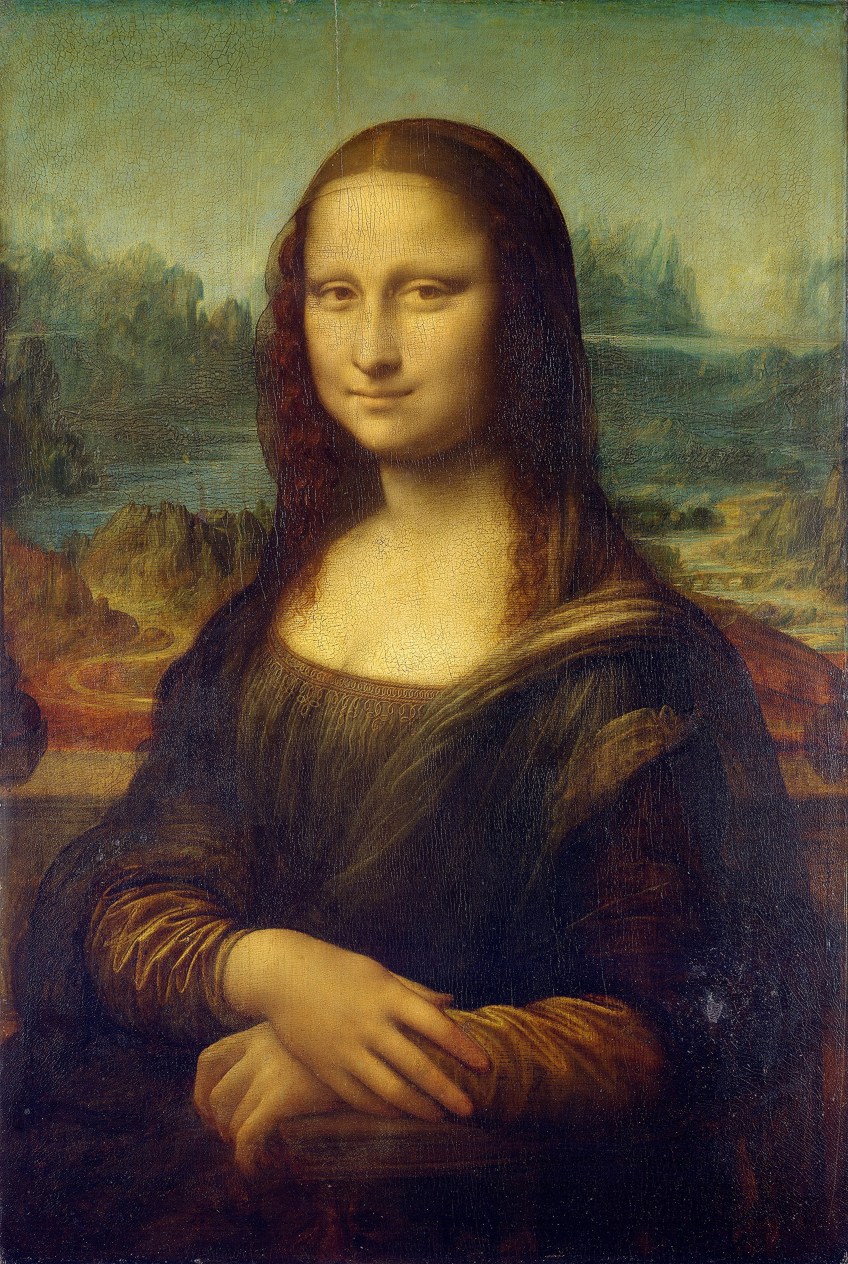
The artwork’s overall harmony, particularly the sitter’s small grin, conveys the concept of a connection linking people and nature.
The Ambassadors (1533) by Hans Holbein the Younger
| Artist | Hans Holbein the Younger |
| Date Created | 1533 |
| Medium | Oil Paint |
| Current Location | The National Gallery |
Hans Holbein, the greatest portrait artist of his day, spent a significant quantity of time in Henry VIII’s courts. The Ambassadors depicts the French ambassador to England, Jean de Dinteville, and his colleague, George de Selve, who were both in their late 20s.
The artwork is strewn with allegorical elements, such as a lute with broken strings, which might represent Henry VIII’s split with Rome in order to divorce Catherine of Aragon and pursue his lover, Anne Boleyn.
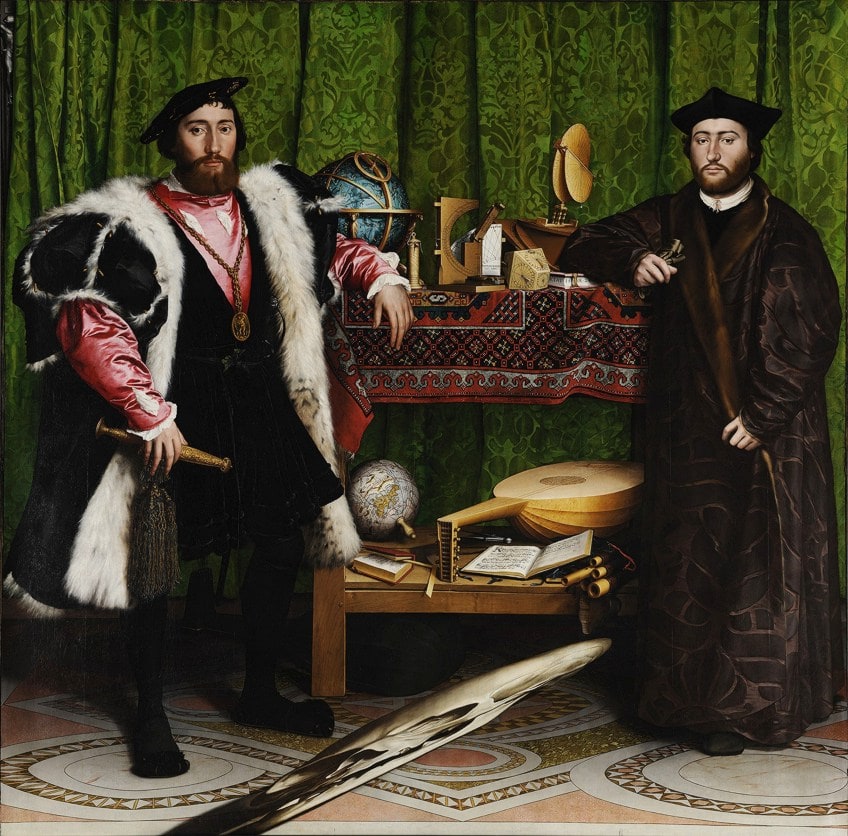
Judith Slaying Holofernes (1610) by Artemisia Gentileschi
| Artist | Artemisia Gentileschi |
| Date Created | 1610 |
| Medium | Oil on Canvas |
| Current Location | Museo e Real Bosco di Capodimonte |
As Judith, a devout young woman from the Israelite city of Bethulia, decapitates Holofernes, the leader of the Assyrian force that had surrounded her city, rivulets of blood trickle down the white sheets. Judith, moved by her people’s predicament and filled with faith in God, took things into her own hands.
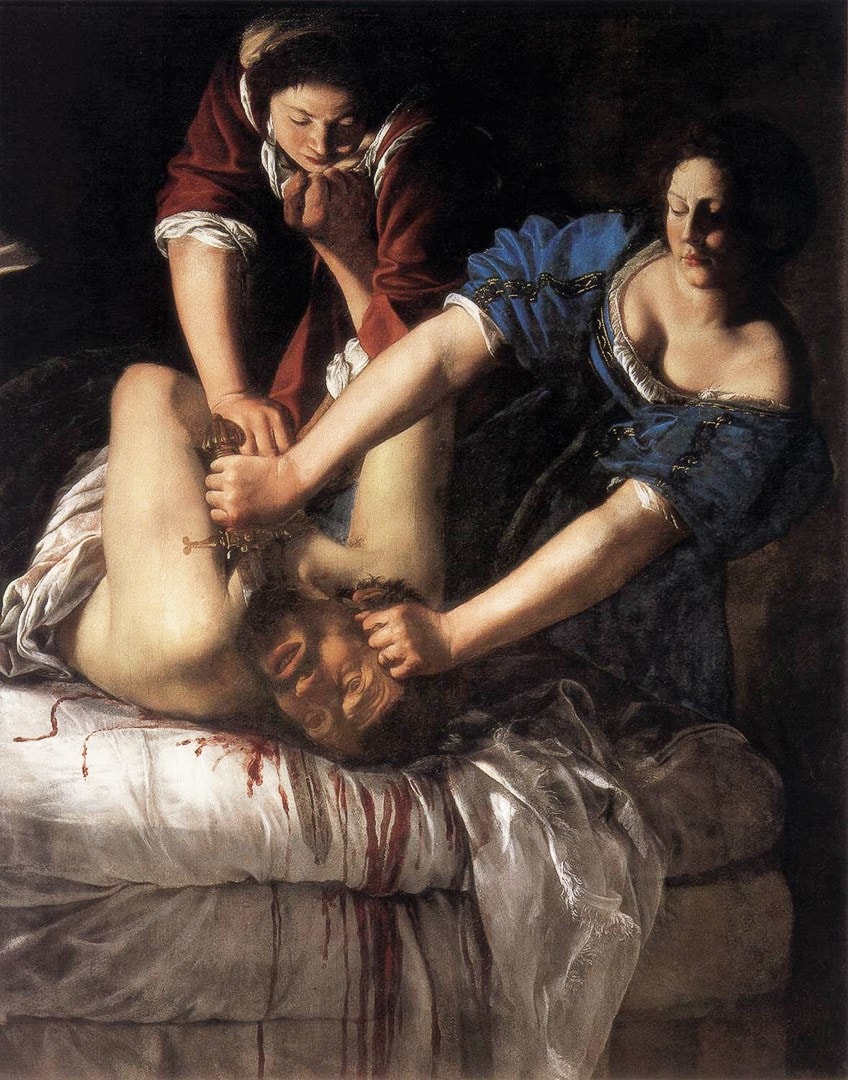
Christ in the Storm on the Sea of Galilee (1633) by Rembrandt van Rijn
| Artist | Rembrandt |
| Date Created | 1633 |
| Medium | Oil on Canvas |
| Current Location | Stolen |
Rembrandt’s most spectacular narrative artwork in America is also his only seascape. It was created in 1633, shortly after Rembrandt arrived in Amsterdam from his home Leiden, and at a time when he was proving himself as the city’s preeminent portrait and historical subject painter.
The comprehensive representation of the scene, the different attitudes of the characters, the reasonably refined brushwork, and the vivid colors are all hallmarks of Rembrandt’s early style.
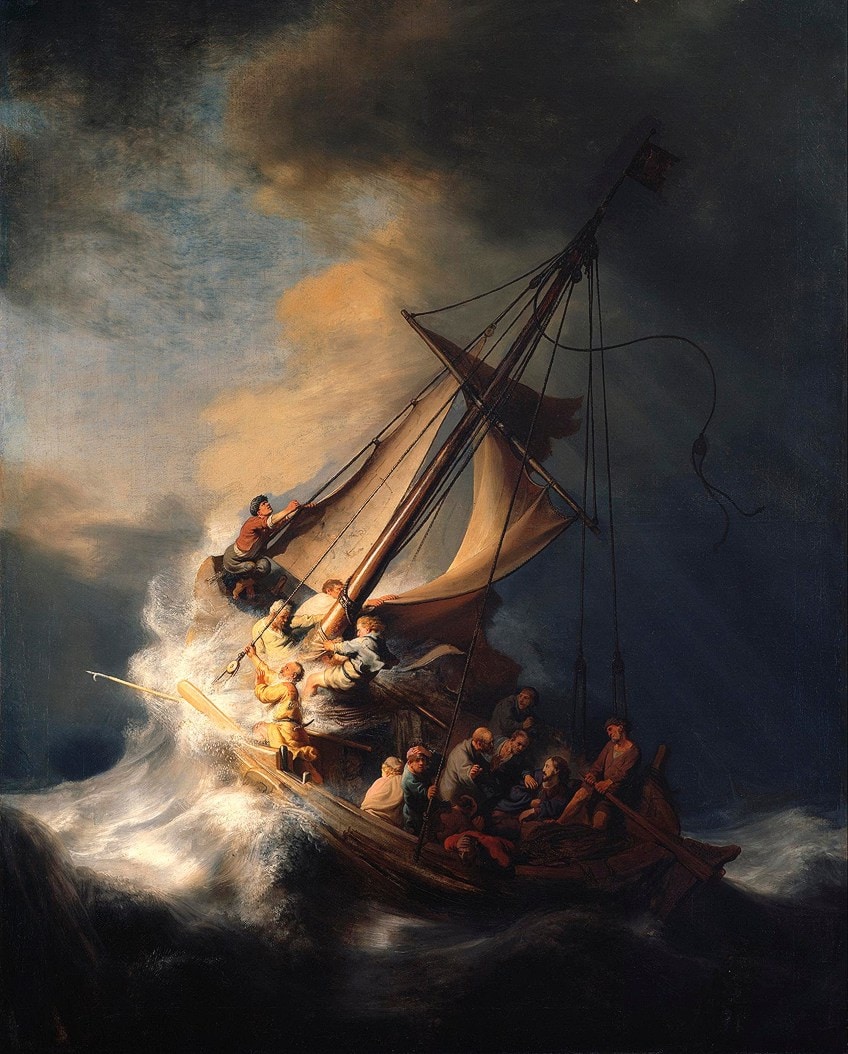
The Night Watch (1642) by Rembrandt van Rijn
| Artist | Rembrandt |
| Date Created | 1642 |
| Medium | Oil on Canvas |
| Current Location | Rijksmuseum |
Rembrandt’s The Night Watch is an example of a particularly distinct form of artwork that was unique to the Northern Netherlands, with the bulk of commissions coming from Amsterdam. It depicts a battalion of civic guardsmen in a group photograph. The primary function of these guardsmen was to protect their city.
As such, they were entrusted with protecting gates, patrolling streets, fighting fires, and generally keeping the city in order.

Girl with a Pearl Earring (c. 1665) by Johannes Vermeer
| Artist | Johannes Vermeer |
| Date Created | 1665 |
| Medium | Oil on Canvas |
| Current Location | Mauritshuis, The Hague |
The artwork has attracted so many individuals throughout history, attracting record numbers to the art museum in The Hague, where it is presently kept. It became legendary because of the girl’s peculiar pose, her mysterious look, the colors, and the exquisite quality of the light.
Although it looks to be portraiture, the piece is really a “tronie” – a painting of an imagined individual depicting a specific kind of character.
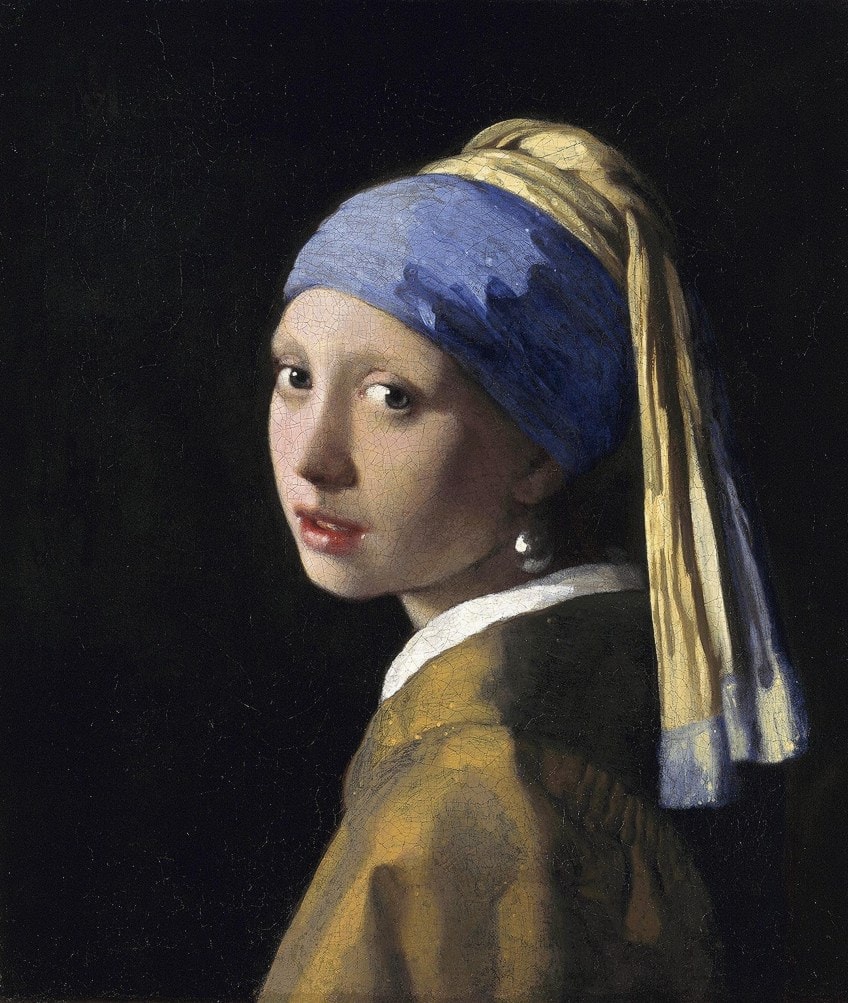
Death of Marat (1793) by Jacques-Louis David
| Artist | Jacques-Louis David |
| Date Created | 1793 |
| Medium | Oil on Canvas |
| Current Location | Musée Oldmasters Museum |
By 1793, the Revolutionary War’s violence had escalated to the point where beheadings at Paris’ Place de la Concorde had become a regular occurrence, prompting a certain Dr. Joseph Guillotine to devise a device that would increase the efficiency of the ax and thus make killings more humane. David was there in the middle of it.
He had joined the Jacobins early in the Revolution, a political organization that would eventually become the most zealous of the different rebel factions.
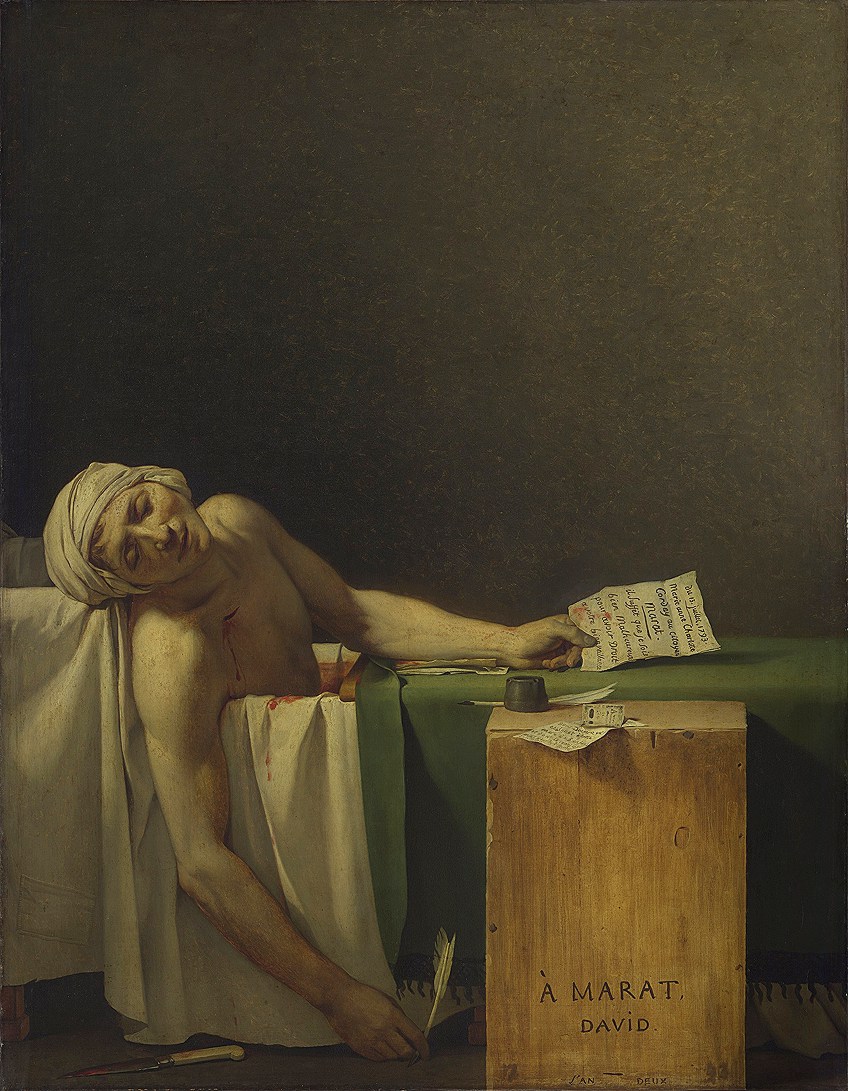
Ophelia (1852) by Sir John Everett Millais
| Artist | Sir John Everett Millais |
| Date Created | 1852 |
| Medium | Oil on Canvas |
| Current Location | Tate Britain |
Ophelia is regarded as one of the major classics of the Pre-Raphaelite period. Millais created a striking and unforgettable image by combining his interests in Shakespearean topics with keen attention to natural detail. His choice of the scene in Hamlet where Ophelia, driven insane by Hamlet’s death of her father, submerges herself was rare for the time.
Millais, on the other hand, was able to demonstrate both his technical ability and aesthetic vision.
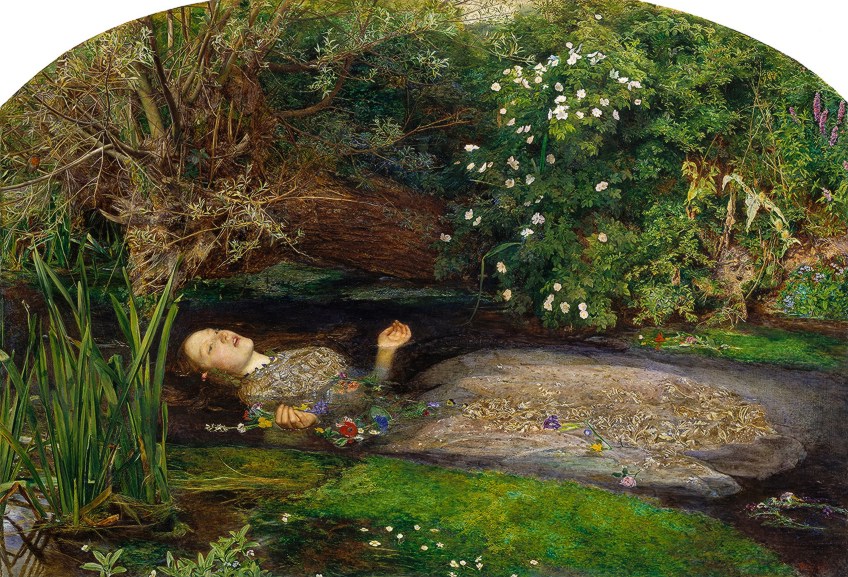
Whistler’s Mother (1871) by James McNeill Whistler
| Artist | James McNeill Whistler |
| Date Created | 1871 |
| Medium | Oil on Canvas |
| Current Location | Musée d’Orsay |
Regarded as one of the most famous art paintings, It was said that Whistler’s model was unable to commit to the task, and it was at this period that James chose to execute a picture of his mother. Before the production of this iconic artwork, there was a great deal of testing. James Whistler requested his mother to model for him while standing up, but she found it too difficult.
Whistler was able to exhibit his approach in tonal arrangement and harmony in this painting.
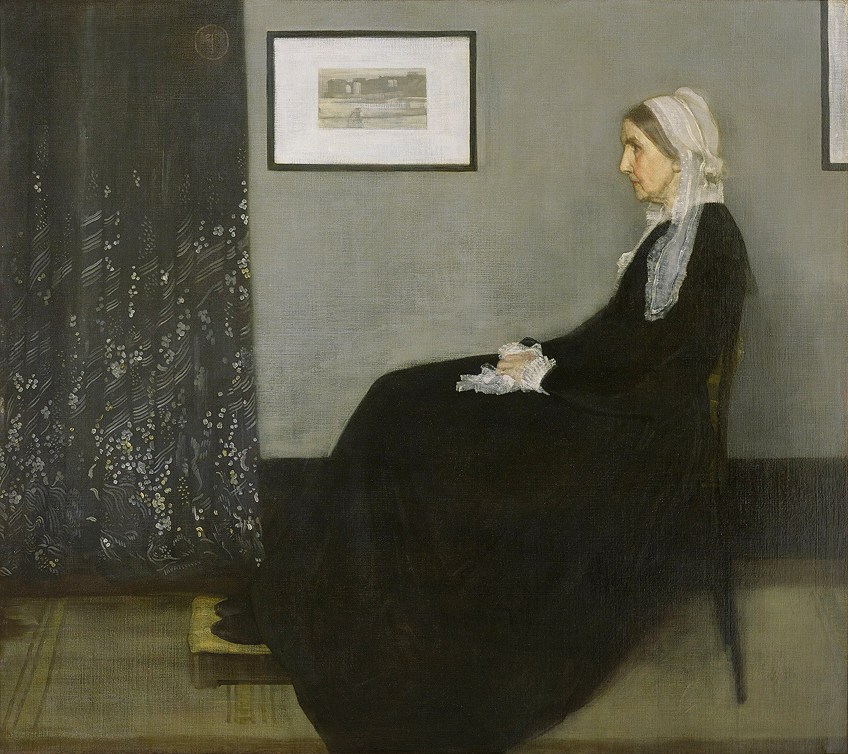
The Gross Clinic (1875) by Thomas Eakins
| Artist | Thomas Eakins |
| Date Created | 1875 |
| Medium | Oil on Canvas |
| Current Location | Philadelphia Museum of Art |
Thomas Eakins’ strong attachment to his birthplace became a recurring topic throughout his career. The Gross Clinic, a painting produced in 1875 that features local physician Samuel David Gross, is perhaps his most well-known and grandiose effort for the city of Philadelphia. The scenario features Gross supervising a surgical procedure and teaching to a group of medical students, referencing Rembrandt’s art-historical predecessor The Anatomy Lesson of Dr. Tulp (1632).
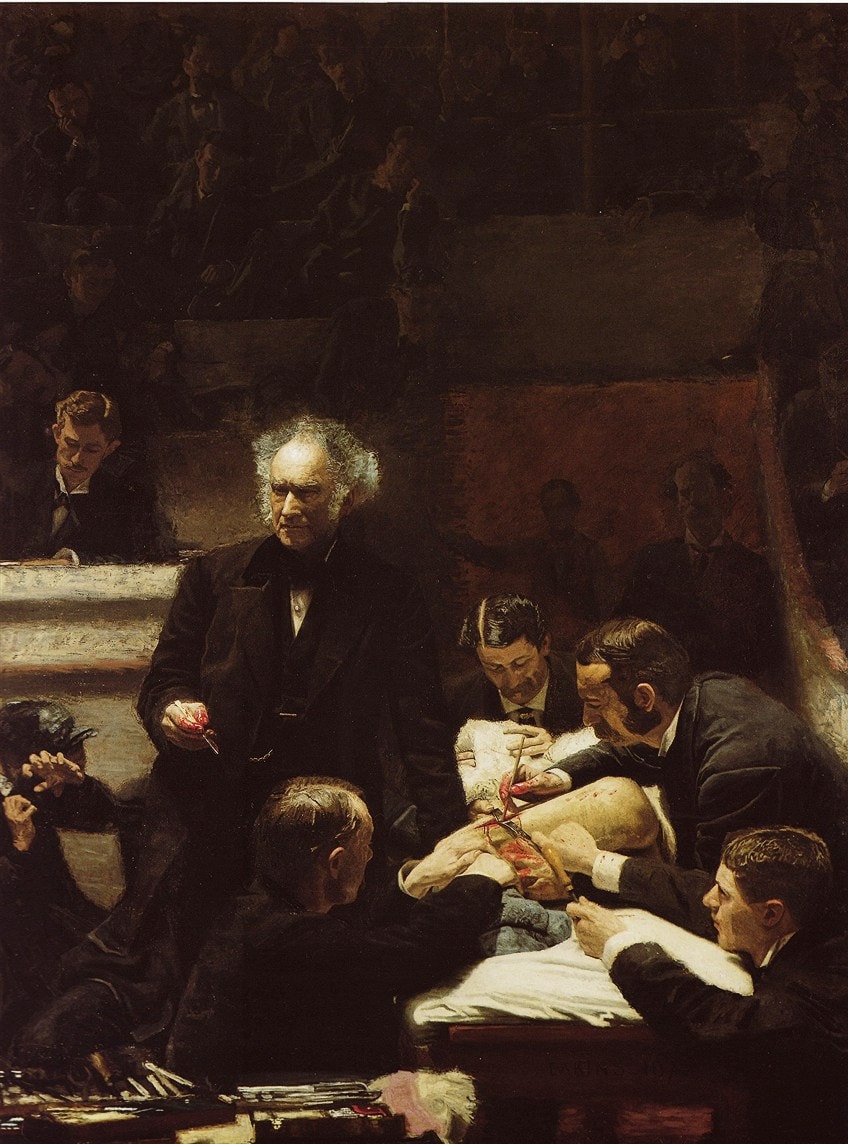
Bal du moulin de la Galette (1876) by Pierre-Auguste Renoir
| Artist | Pierre-Auguste Renoir |
| Date Created | 1876 |
| Medium | Oil on Canvas |
| Current Location | Musée d’Orsay |
Translated to mean “Dance at Le Moulin de la Galette“, this famous artwork is a contemporary art masterpiece that is one of the most renowned Impressionist paintings and a stunning example of Renoir’s knack for capturing dappled light. Its modernity stems from both its selected matter – a typical Sunday afternoon picture of working-class Parisians at leisure at the Moulin de la Galette – and its free Impressionist-style brushwork.
The viewer’s gaze wanders around the motion-filled surface, aware of the bold, highly colored brushstrokes yet unable to focus on any one shape in particular.
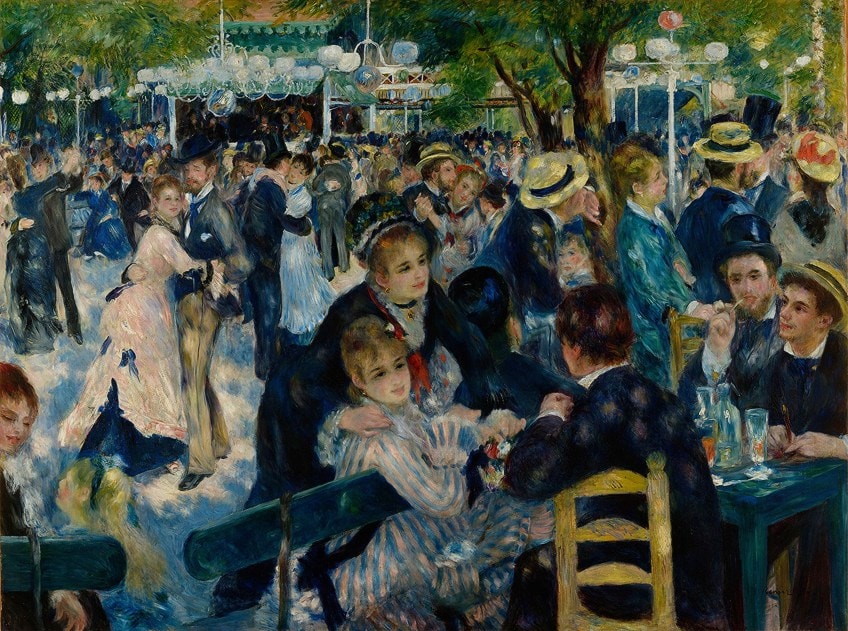
Portrait of Madame X (1884) by John Singer Sargent
| Artist | John Singer Sargent |
| Date Created | 1884 |
| Medium | Oil on Canvas |
| Current Location | Metropolitan Museum of Art, Manhattan |
Virginie Gautreau was a wealthy businessman’s wife. She was regarded as a “professional beauty,” an English word for persons who advanced socially by using their interpersonal skills and attractiveness. The picture was a proposal by Sargent to depict the young socialite rather than a commission.
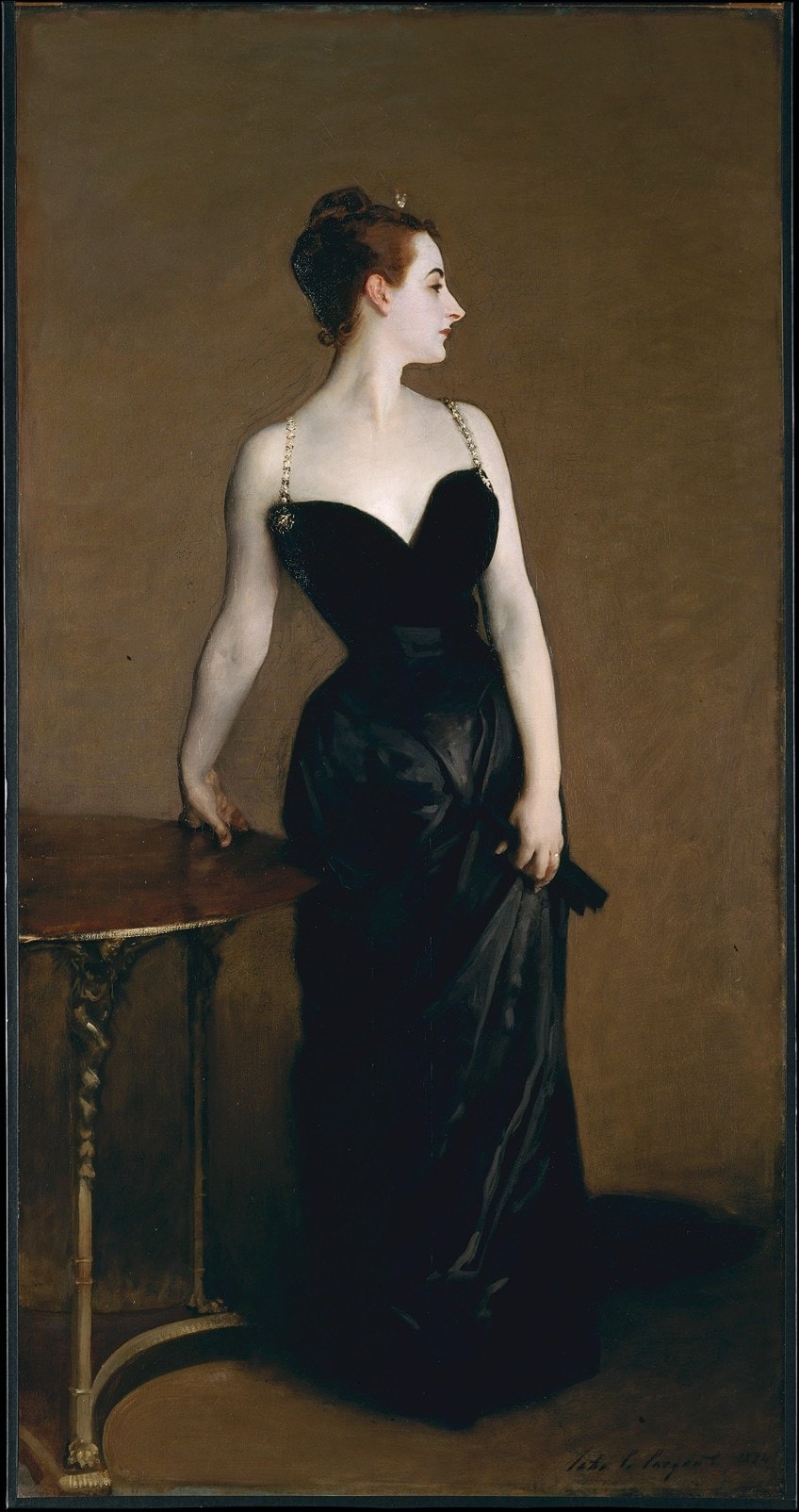
A Sunday Afternoon on the Island of La Grande Jatte (1884-1886) by Georges Seurat
| Artist | Georges Seurat |
| Date Created | 1886 |
| Medium | Oil Paint |
| Current Location | Art Institute of Chicago |
Seurat was able to catch a fascinating picture of aristocratic Parisian life in the nineteenth century despite its remote position. The image prompted a slew of interpretations and was chastised for being too technical. However, upon its debut, it was hailed as a great work of precise proportions.
Seurat’s painting technique varied significantly from that of his school, and after quitting it, he opted to journey to the Island of La Grande Jatte.
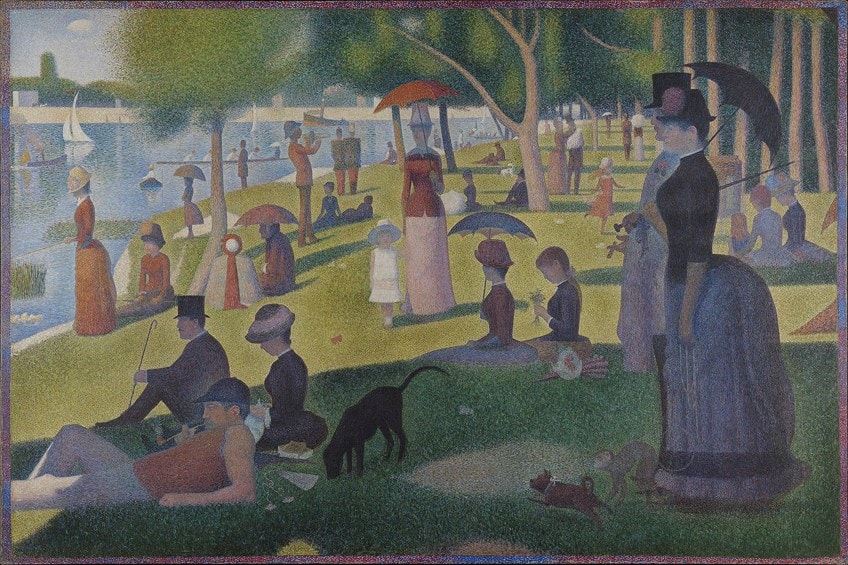
Cafe Terrace at Night (1888) by Vincent van Gogh
| Artist | Vincent van Gogh |
| Date Created | 1888 |
| Medium | Oil on Canvas |
| Current Location | Kröller-Müller Museum |
This vibrant outdoor view painting is a stunning work of art, depicting the viewpoint of a carefree observer who enjoys the pleasures of his environment without moral concern. It echoes Van Gogh’s sentiment that “the night is more vibrant and vividly colored than the day,” as he put it. The color is brighter, and the attention is pulled to the steep edges of neighboring sections, which form irregular patterns that fit together like a jigsaw puzzle.
The eyes are challenged by the long-term partition of this region into a large item and backdrop theme; the distant and close areas are both different.

The Starry Night (1889) by Vincent van Gogh
| Artist | Vincent van Gogh |
| Date Created | 1889 |
| Medium | Oil on Canvas |
| Current Location | Museum of Modern Art |
A night sky swirling with vivid blue spirals, a dazzling golden crescent moon, and constellations depicted as radiating spheres dominate the oil-on-canvas artwork. One or two flame-like cypress trees loom over the scene to the side, their black limbs curving and undulating to the motion of the partly obscured sky. A structured settlement lies in the distance in the bottom right of the canvas, among all of this activity.
The modest houses and the thin spire of a church, which stands as a beacon against undulating blue hills, are made out of straight, controlled lines.
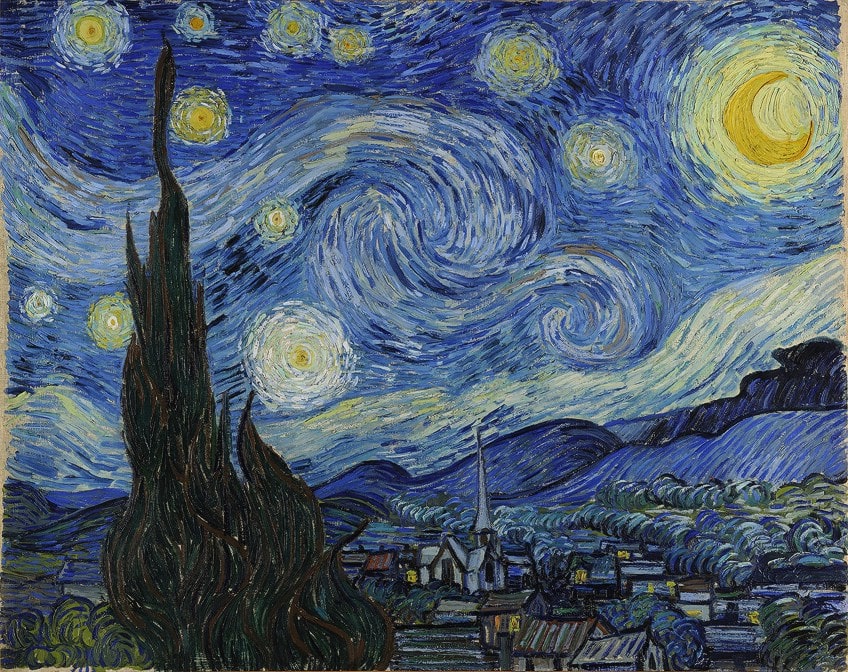
Self-Portrait Without a Beard (1889) by Vincent van Gogh
| Artist | Vincent van Gogh |
| Date Created | 1889 |
| Medium | Oil on Canvas |
| Current Location | Private Collection |
Despite his own dire financial condition, Van Gogh had always supported the work of his friends, particularly Bernard and Gauguin. His brother Theo got a little sum of money in the summer of 1888, a portion of which went for Van Gogh’s ongoing care. Theo recommended Gauguin stay with Van Gogh in order to save the two painters’ expenditures by sharing their lodging.
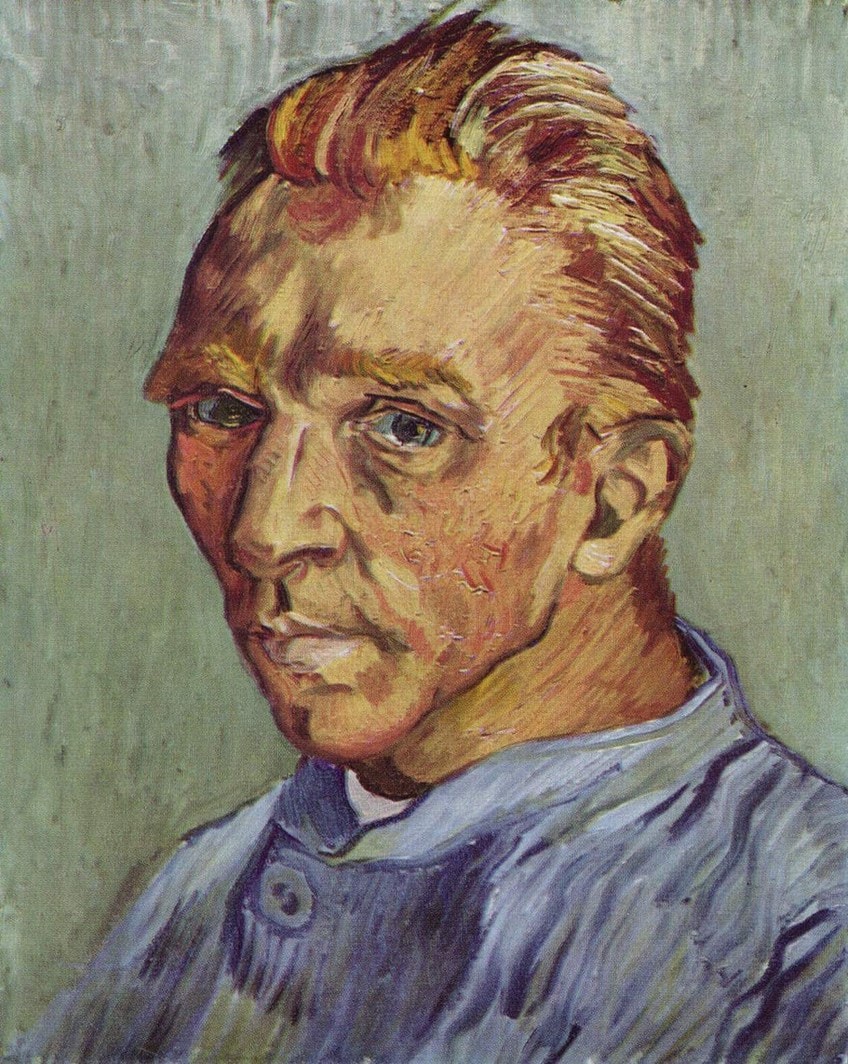
The Scream (1893) by Edvard Munch
| Artist | Edvard Munch |
| Date Created | 1893 |
| Medium | Oil and Pastel on Board |
| Current Location | Munch Museum |
The Scream, comparable only to Mona Lisa, may just be the most famous human image in Western art history. Its ambiguous, skull-shaped head, extended hands, huge eyes, flaring nostrils, and oval mouth have been ingrained in our shared cultural awareness; the whirling blue environment, particularly the blazing orange and yellow sky, has spawned a slew of interpretations about the scenario represented.
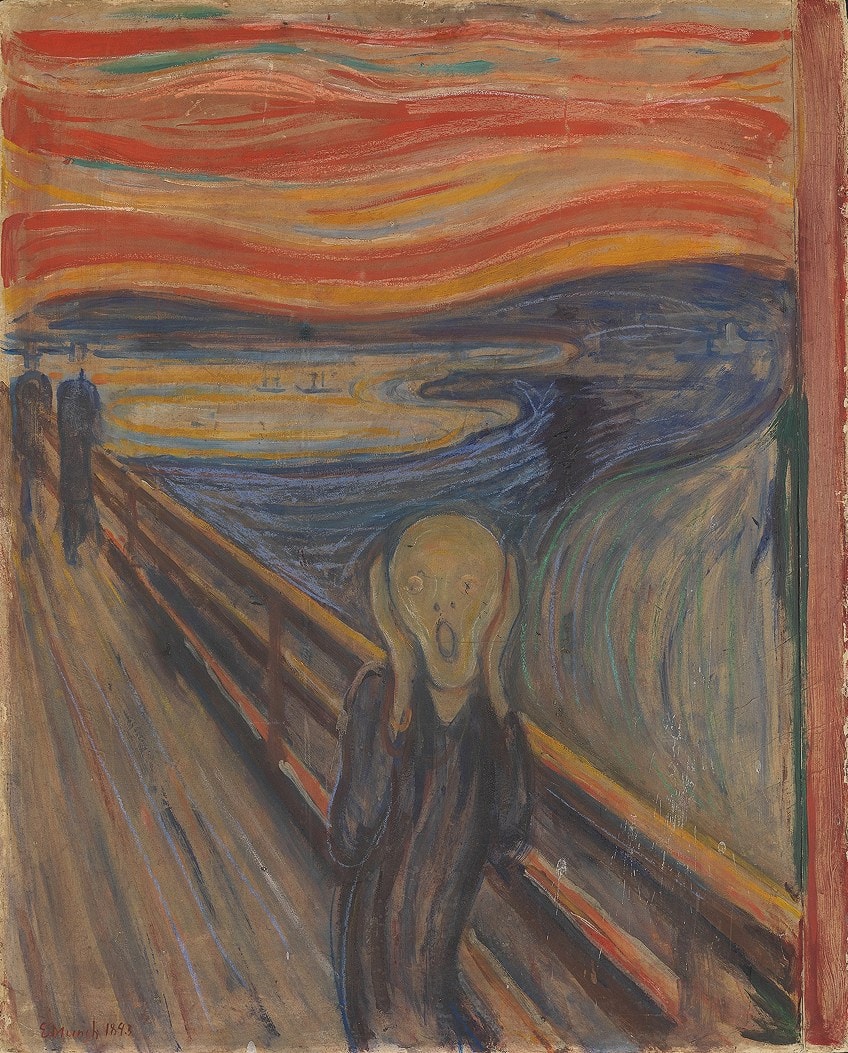
At the Moulin Rouge (c. 1895) by Henri de Toulouse-Lautrec
| Artist | Henri de Toulouse-Lautrec |
| Date Created | c. 1895 |
| Medium | Oil on Canvas |
| Current Location | Art Institute of Chicago |
Henri de Toulouse-Lautrec has been connected with the Moulin Rouge from its inception in 1889 when the famed nightclub’s proprietor purchased the artist’s Equestrienne for the entrance. Toulouse-Lautrec was inhabited.
At the Moulin Rouge, he was joined by his cousin, doctor Gabriel Tapié de Céleyran, who was holding photographs of the famed nightclub’s regulars, including himself (the little figure in the middle background).
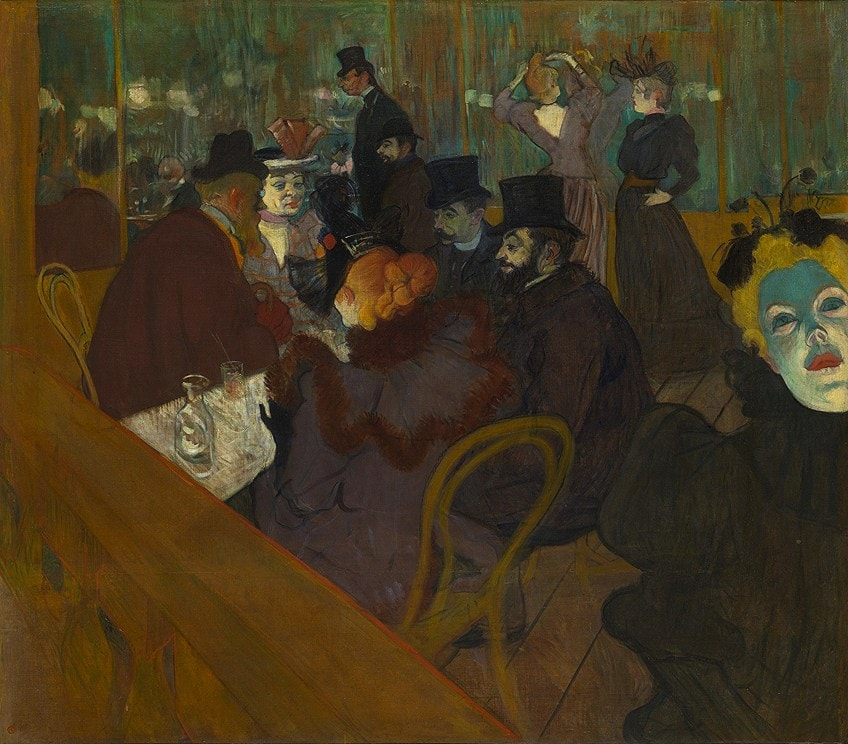
Flaming June (c. 1895) by Sir Frederic Leighton
| Artist | Sir Frederic Leighton |
| Date Created | c. 1895 |
| Medium | Oil Paint |
| Current Location | Museo de Arte de Ponce |
Flaming June is an excellent illustration of Leighton’s talent, as seen by the realism of numerous components in this image. One can nearly reach out and touch the draped material. Then there are the marbled textures and brilliant colors that catch your eye.
This picture was recently lent to the Leighton House Museum in London, which linked it with its history. It has made many trips throughout the United Kingdom before arriving in Puerto Rico.
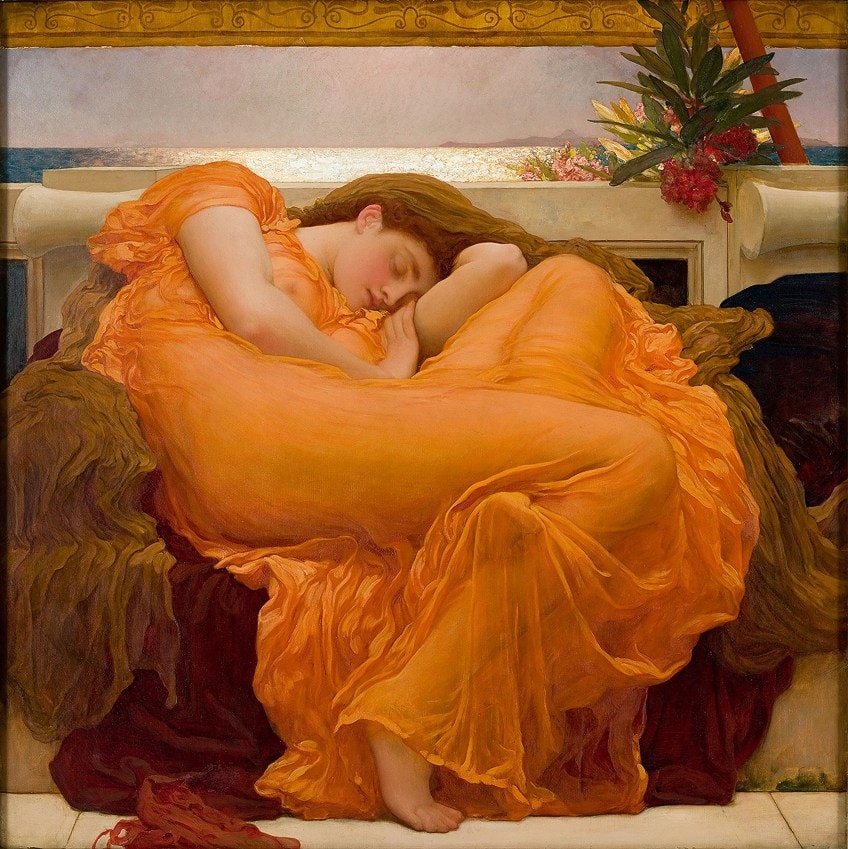
Two Tahitian Women (1899) by Paul Gauguin
| Artist | Paul Gauguin |
| Date Created | 1899 |
| Medium | Oil Paint |
| Current Location | National Gallery of Art |
Regardless of the fact that Tahiti is depicted as a faultless paradise, the picture challenges the observer with two topless ladies in a similar and traditional fashion that compares women’s bosom to fruits or blossoms. Paul Gauguin’s painting was one of his last pieces in Tahiti.
In this picture, he emphasized the tranquil and beautiful qualities of Tahiti’s native ladies.
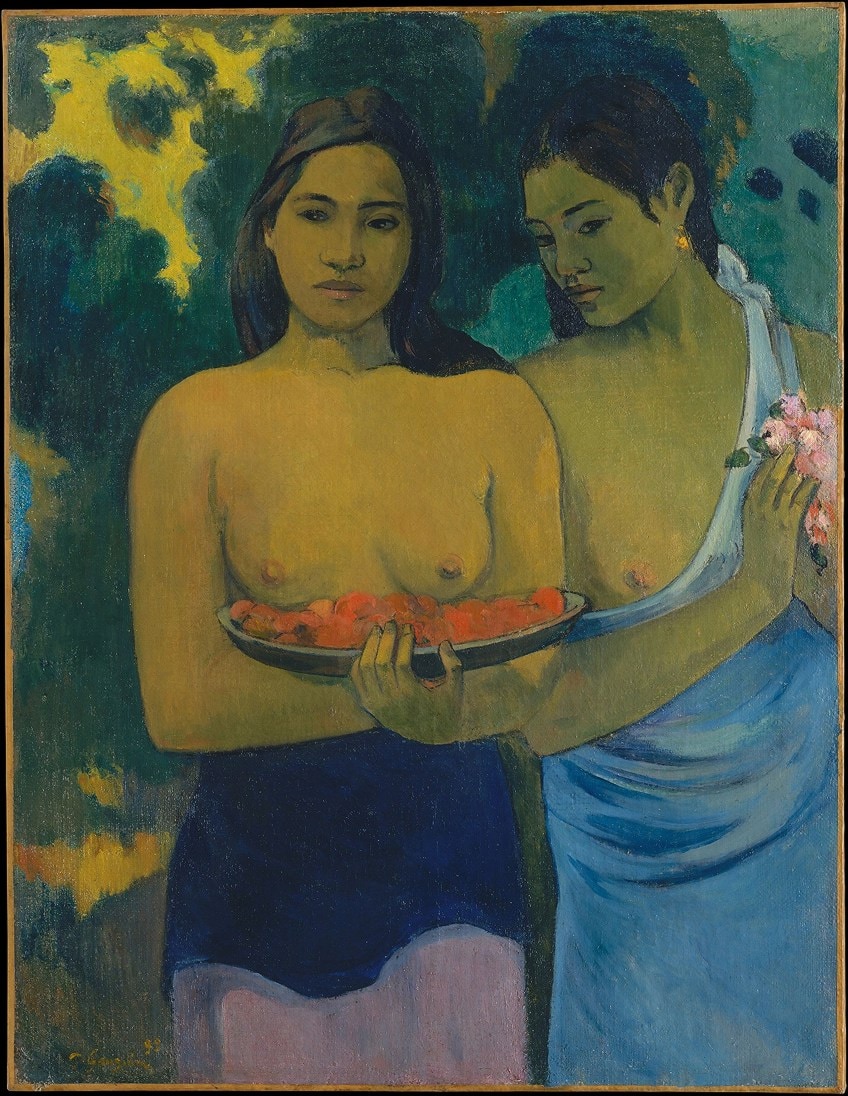
The Kiss (1908) by Gustav Klimt
| Artist | Gustav Klimt |
| Date Created | 1908 |
| Medium | Oils and Gold Leaf |
| Current Location | Austrian Gallery, Belvedere |
The Kiss displays an affectionate couple kneeling in a flowery meadow. The male, dressed in a geometrically patterned robe and wearing a vine crown on his head, clutches the lady’s face as he moves in to kiss her. The female figure has flowers in her hair and wears a colorful, naturally patterned outfit that contrasts with her partner’s.
Her eyes are contentedly closed as she puts her arms around his shoulders, enhancing the scene’s tranquility and closeness.
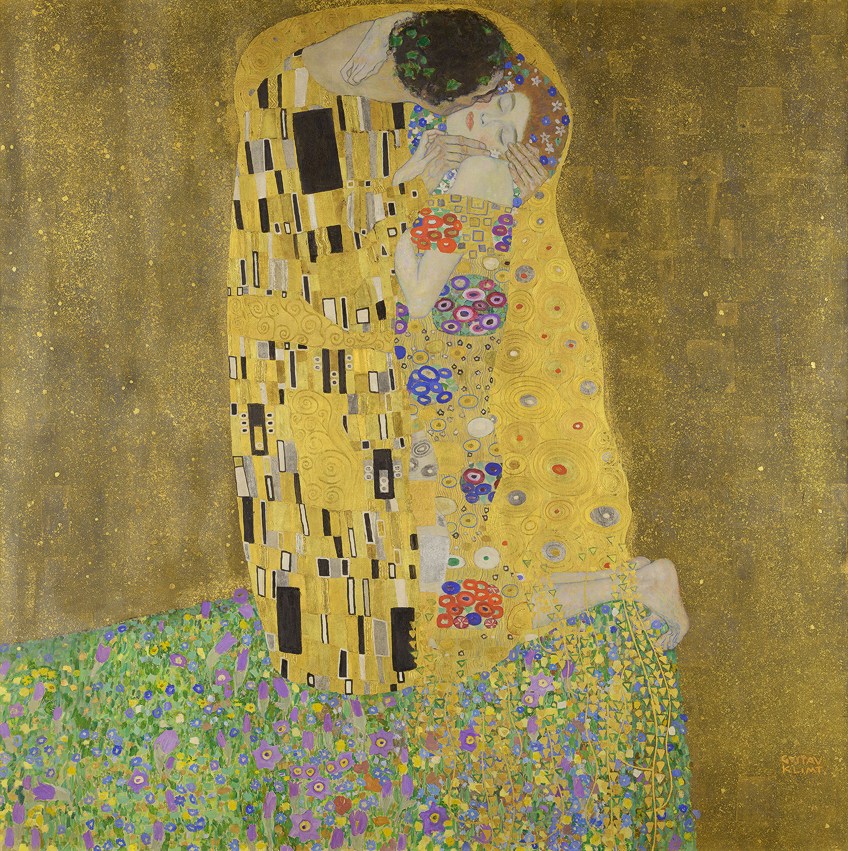
The Cyclops (c. 1914) by Odilon Redon
| Artist | Odilon Redon |
| Date Created | c. 1914 |
| Medium | Oil on Board |
| Current Location | Kröller-Müller Museum |
Galatea is seen sleeping on the lower right, her bare figure melting into the floral hill slope. The shoulders of Polyphemus rise over a mountain range in the top part of the image, as he turns his one eye towards the direction of the naiad.
Polyphemus seemed to have concealed himself from the sprite behind the rocky landscape, too afraid to address her “helpless” figure directly.
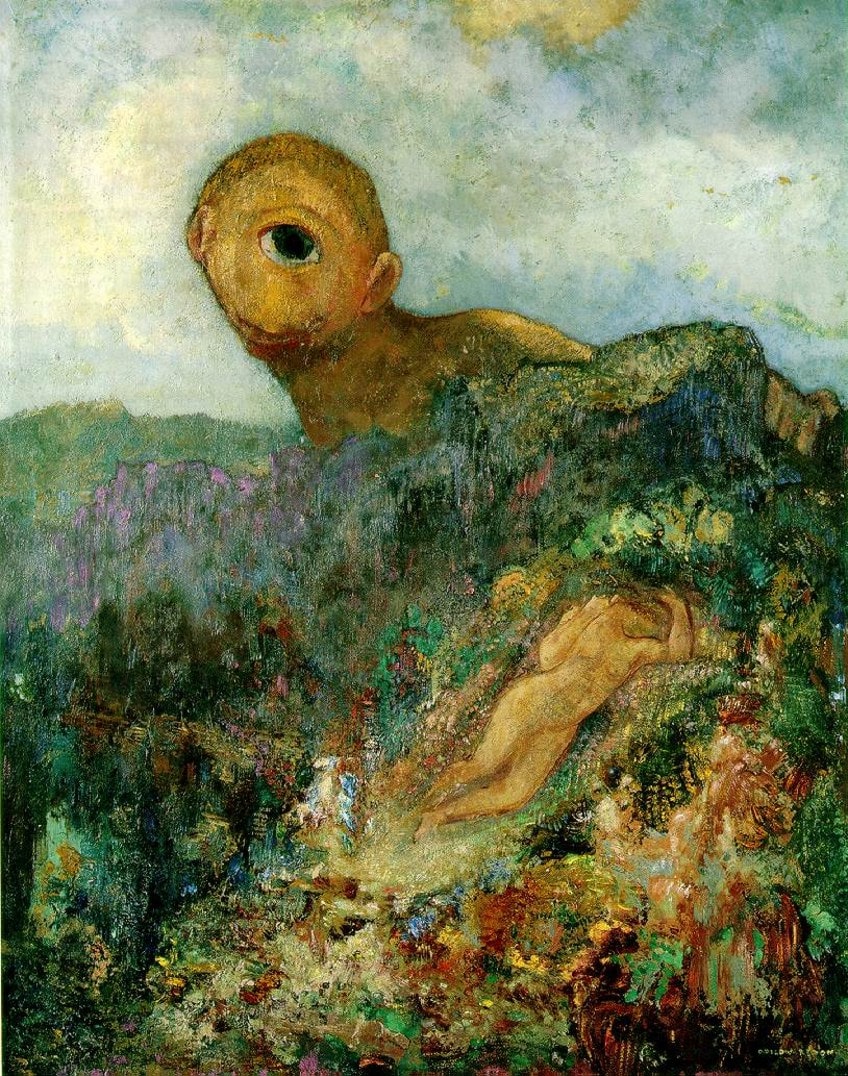
Three Musicians (1921) by Pablo Picasso
| Artist | Pablo Picasso |
| Date Created | 1921 |
| Medium | Oil on Canvas |
| Current Location | Gallatin Collection |
Three Musicians appears to be a collage formed from cut-out pieces of colorful paper, despite the fact that it is an oil painting. The forms are reduced to angular patterns that connect like jigsaw puzzles, and the flat colors produce a surface design with many spatial uncertainties.
The backdrop wall is dark brown, as are a foreground table, sections of the characters’ features, and the figure of a dog lying under the table.
American Gothic (1930) by Grant Wood
| Artist | Grant Wood |
| Date Created | 1930 |
| Medium | Oil on Beaverboard |
| Current Location | Royal Academy of Arts |
The image portrays a middle-aged couple, commonly understood as a farmer and his wife or daughter, posing in front of their residence, a wooden farm constructed in the Carpenter Gothic architectural style popular in the 1890s. Because the people are so close to the observer, little of the backdrop is visible.
The artist had based the farmstead on Dibble House, a home he saw in Eldon, Iowa, and outfitted his sister Nan and his dentist, Dr. Byron McKeeby, as figures for the couple.
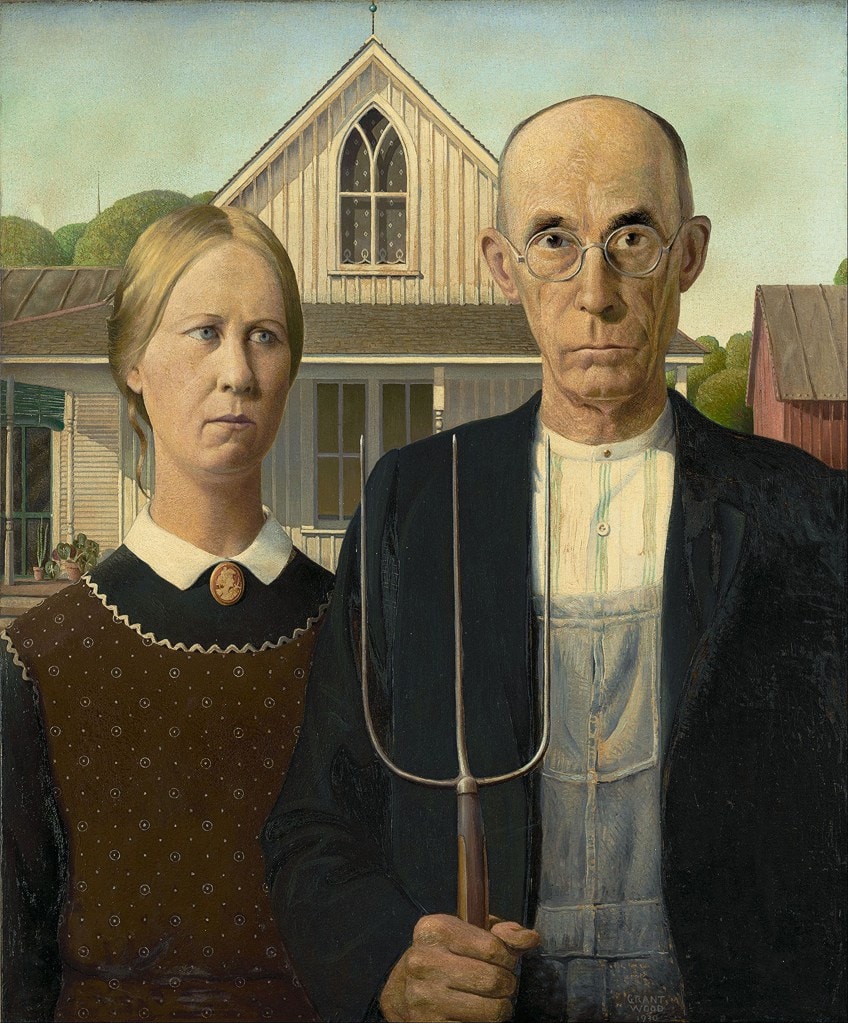
The Persistence of Memory (1931) by Salvador Dalí
| Artist | Salvador Dalí |
| Date Created | 1931 |
| Medium | Oil on Canvas |
| Current Location | Museum of Modern Art |
The Persistence of Memory has a self-portrait with a soft watch draped over it. These soft watches depict what Dalí referred to as the “camembert of time,” implying that the idea of time had lost any value in the subconscious world. The ants swarming over the pocket watch imply decoy, which is nonsensical given that the timepiece is metallic.
These “paranoid-critical” visuals represent Dalí’s interpretation and assimilation of the Freudian theory of the unconscious and its availability to the dormant wishes and psychosis of the human psyche, such as the subconscious fear of dying alluded to in this artwork.
The Flower Carrier (1935) by Diego Rivera
| Artist | Diego Rivera |
| Date Created | 1935 |
| Medium | Oil and Tempera |
| Current Location | San Francisco Museum of Modern Art |
A peasant in white attire with yellow sombrero struggles on all fours with a ridiculously enormous basket of flowers attached to his shoulders with a yellow strap in the vibrant artwork. A lady, most likely the farmer’s spouse, stands behind him, attempting to assist with the basket’s support as he strives to climb to his feet.
Some say that the massive basket slung to the man’s back represents the burdens of an unskilled worker in a contemporary, capitalistic environment.
Guernica (1937) by Pablo Picasso
| Artist | Pablo Picasso |
| Date Created | 1937 |
| Medium | Oil on Canvas |
| Current Location | Museo Nacional Centro de Arte Reina Sofía |
Some consider Pablo Picasso’s masterwork of the Spanish Civil Battle to be the single finest war artwork of all history. Picasso’s artwork, in addition to being a huge allegorical picture of the horrors of war, may have purposely molded spectators into proactive participants, promoting both collective change and policy choices.
Picasso hoped that by doing so, he would be able to impact changes in government policy and expand the dialogue beyond the confines of his war-torn country.
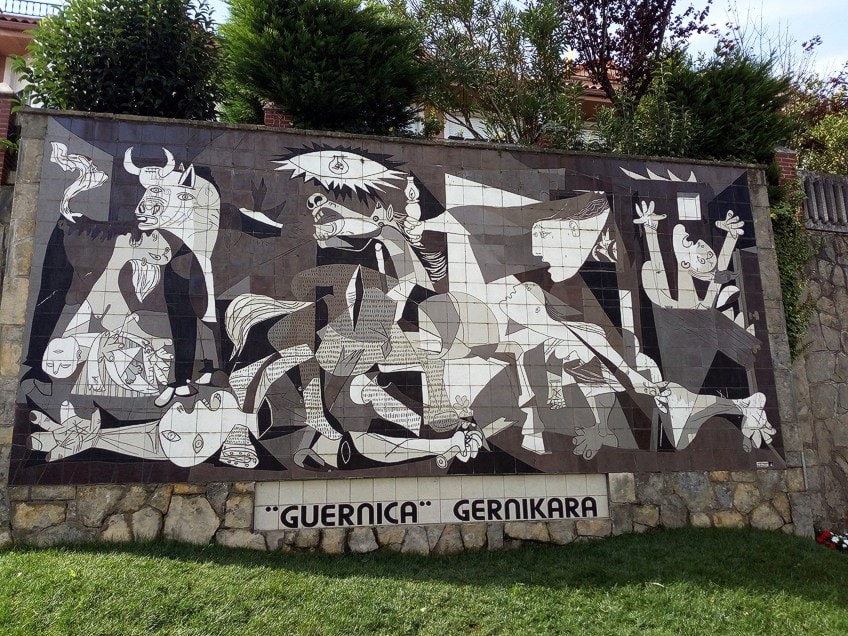
The Two Fridas (1939) by Frida Kahlo
| Artist | Frida Kahlo |
| Date Created | 1939 |
| Medium | Oil on Canvas |
| Current Location | Museo de Arte Moderno |
Several scholars believe that the two characters in the picture symbolize Frida’s blended background. Guillermo Kahlo, her father, was German, and Matilde Calderon, her mother, was Mexican. Another explanation is that the Tehuana Frida was cherished by her husband Diego Rivera, whilst the European Frida was spurned by him.
No. 5, 1948 (1948) by Jackson Pollock
| Artist | Jackson Pollock |
| Date Created | 1948 |
| Medium | Oil on Fiberboard |
| Current Location | Private Collection |
This piece was constructed on an eight-by-four-foot piece of fiberboard. Jackson Pollock’s approach for this piece was the utilization of liquid paints. He opted to abandon the traditional method of painting on canvas. No. 5 can be seen with a lot of brown and yellow paint splattered over it. Pollock was motivated to make this painting by his personal feelings. He departed from the customary use of liquid paints.
The painting’s pattern seems nest-like and elicited a variety of feelings among individuals who saw it.
The Son of Man (1964) by René Magritte
| Artist | René Magritte |
| Date Created | 1964 |
| Medium | Oil on canvas |
| Current Location | Private collection |
Harry Torczyner, Magritte’s close friend, counselor, and patron commissioned a self-portrait of the artist in 1963. However, letters published by Magritte show that he struggled to create his own portrait. Magritte referred to his troubles as a “conscience problem.” When Magritte completed his self-portrait, the resultant image was of an unknown gentleman wearing a bowler hat and captioned “The Son of Man.”
It looks to be a simple drawing at first glance, yet it is immensely puzzling.
And with that, we have concluded our list of old famous paintings. These famous art paintings are regarded as some of the most well-known in the history of art. These popular paintings all added something new to the art scene and are still enjoyed today. What did you think of our list of the most famous paintings?
Frequently Asked Questions
Out of All the Old Famous Paintings, Which Are the Most Famous Paintings?
There are many popular paintings in the history of art. One of the most famous paintings must surely be the Mona Lisa by Leonardo da Vinci. It is one of the most iconic images in the known world.
What Medium Was Popular for the Production of Famous Art Paintings?
Many mediums have been used to create old famous paintings that we love. From oil to watercolor, as well as tempera. The most common medium for many of the classics seems to be oil on canvas, though.
Isabella studied at the University of Cape Town in South Africa and graduated with a Bachelor of Arts majoring in English Literature & Language and Psychology. Throughout her undergraduate years, she took Art History as an additional subject and absolutely loved it. Building on from her art history knowledge that began in high school, art has always been a particular area of fascination for her. From learning about artworks previously unknown to her, or sharpening her existing understanding of specific works, the ability to continue learning within this interesting sphere excites her greatly.
Her focal points of interest in art history encompass profiling specific artists and art movements, as it is these areas where she is able to really dig deep into the rich narrative of the art world. Additionally, she particularly enjoys exploring the different artistic styles of the 20th century, as well as the important impact that female artists have had on the development of art history.
Learn more about Isabella Meyer and the Art in Context Team.
Cite this Article
Isabella, Meyer, “The 31 Most Famous Paintings – Must-Know Artworks.” Art in Context. November 2, 2023. URL: https://artincontext.org/famous-paintings/
Meyer, I. (2023, 2 November). The 31 Most Famous Paintings – Must-Know Artworks. Art in Context. https://artincontext.org/famous-paintings/
Meyer, Isabella. “The 31 Most Famous Paintings – Must-Know Artworks.” Art in Context, November 2, 2023. https://artincontext.org/famous-paintings/.


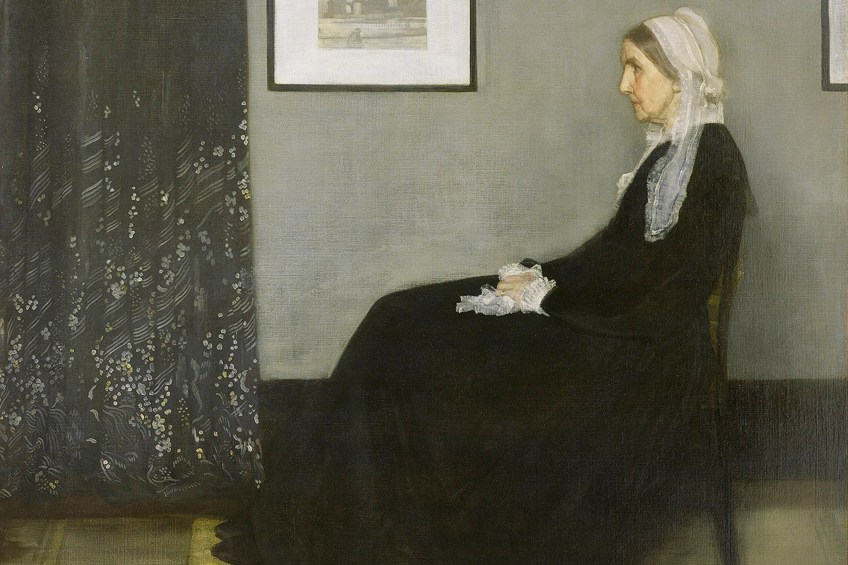

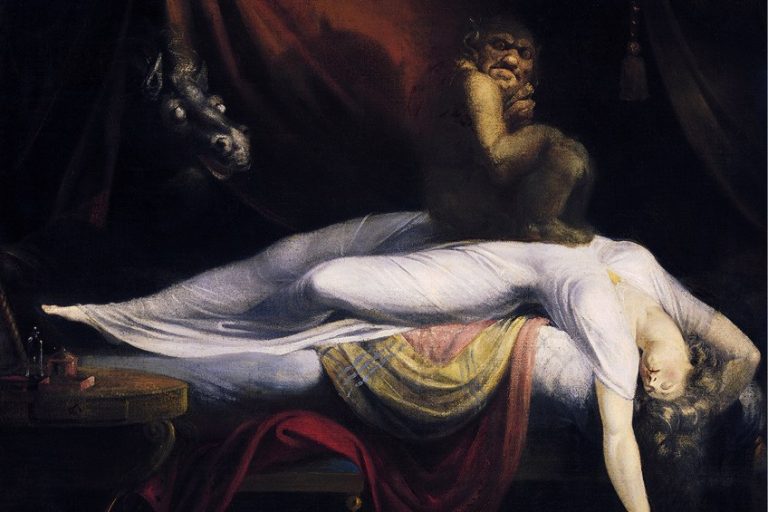
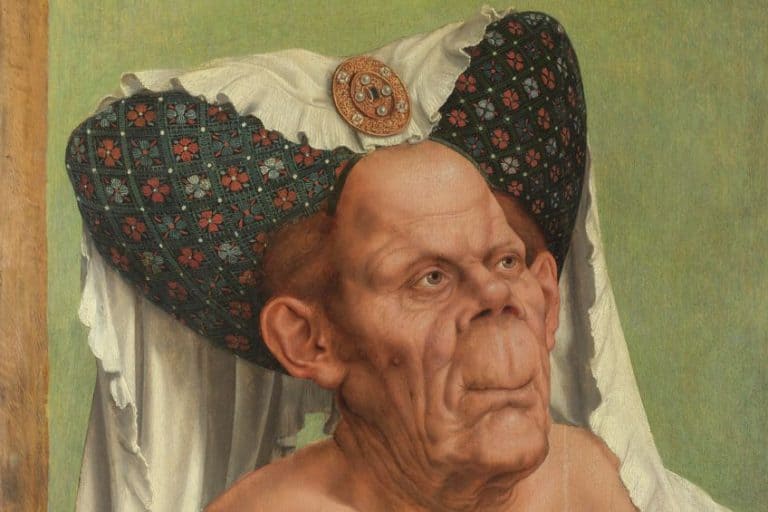
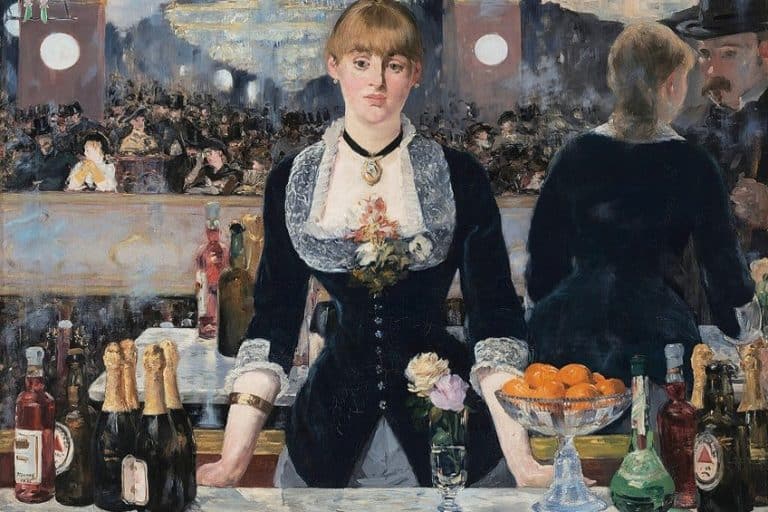
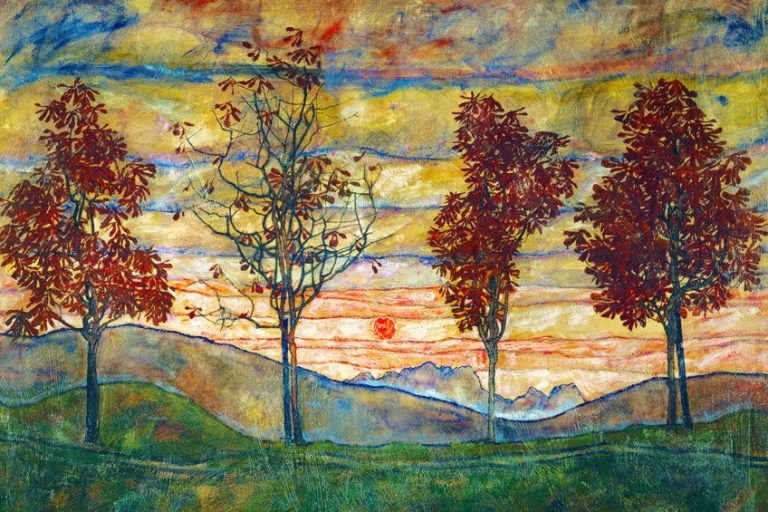


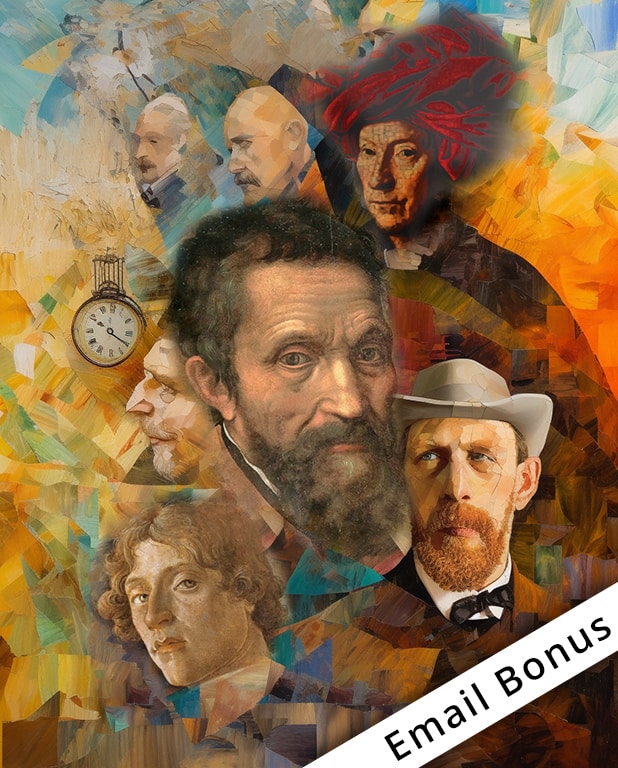

YOU will NEVER be any kind of an artist. I was part of a High School Reunion committee a
couple of years ago. Talking to a classmate, we were both told the same thing from the HS
teacher. We were the only two that were picked on. She received a degree in Art and taught art classes in school.
I studied art in college and did very well in my classes. I was this close to being a Medical
Illustrator for one of the local hospitals. Had to stop to buy food for the family and get a house. I never have forgotten the fun of art. I’ve done a few pieces of art that are pretty good.
I absolutely love this site. All the information on artists, their styles, their inspirations. I can’t wait for the next letter from you. I have rediscovered the beauty and wonder of art.
Thank You